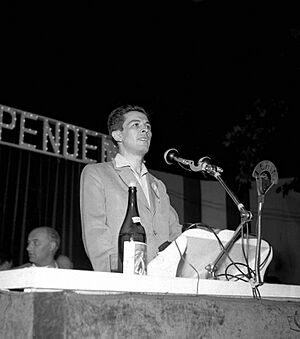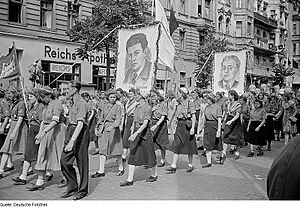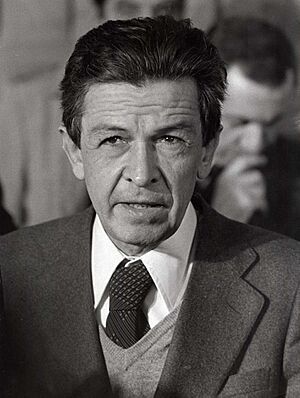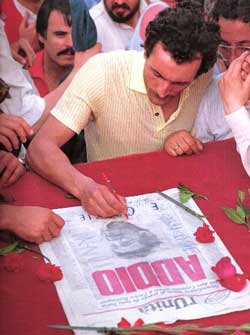Enrico Berlinguer facts for kids
Quick facts for kids
Enrico Berlinguer
|
|
|---|---|
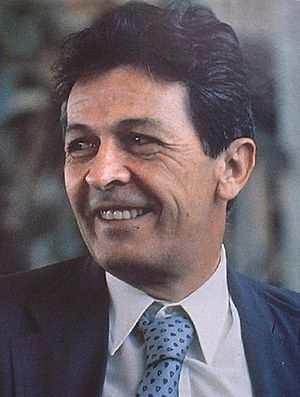 |
|
| General Secretary of the Italian Communist Party |
|
| In office 17 March 1972 – 11 June 1984 |
|
| President | Luigi Longo |
| Preceded by | Luigi Longo |
| Succeeded by | Alessandro Natta |
| Secretary of the Italian Communist Youth Federation |
|
| In office 12 April 1949 – 14 March 1956 |
|
| Preceded by | Agostino Novella |
| Succeeded by | Renzo Trivelli |
| Member of the Chamber of Deputies | |
| In office 5 June 1968 – 11 June 1984 |
|
| Constituency | Rome |
| Personal details | |
| Born | 25 May 1922 Sassari, Italy |
| Died | 11 June 1984 (aged 62) Padua, Italy |
| Political party | Italian Communist Party |
| Children | 4, including Bianca Berlinguer |
| Signature | |
Enrico Berlinguer (born May 25, 1922 – died June 11, 1984) was an important Italian politician. He was the most popular leader of the Italian Communist Party (PCI). He led the party as its national secretary from 1972 until his death. This was a difficult time in Italy, known as the Years of Lead, with social problems and conflicts.
During his time as leader, Berlinguer made the party more independent from the Communist Party of the Soviet Union. He wanted the party to be more moderate in Italian politics. He pushed for cooperation and national unity. This approach was called Eurocommunism, and he was a main supporter of it. Other major communist parties in Western Europe, like those in Spain and France, also adopted this idea. In 1977, Berlinguer met with leaders from these parties in Madrid.
Berlinguer called his different idea of socialism the terza via (third way). This was different from both the Soviet system and the capitalism of Western countries during the Cold War.
Under Berlinguer, the PCI became very successful. It won many votes in regional and local elections in 1975. In the 1976 Italian general election, the party got 34% of the votes. This was its highest ever share. With this success, Berlinguer worked on the Historic Compromise with the Christian Democracy party. This meant the PCI supported the government in exchange for being consulted on important decisions and social reforms.
Berlinguer took a strong stand against terrorism. He also helped guide Italian labor unions to ask for more reasonable wage increases. This was important because Italy had high inflation after the 1973 oil crisis. However, the government did not make enough compromises, so the PCI left the coalition in 1979. The party then remained in opposition.
Berlinguer was a serious and humble person, but he was also very inspiring. Even though the PCI faced challenges, he remained a popular politician. People respected him for his strong beliefs and brave decisions. He presented the PCI as an honest party in a time when Italian politics had a lot of corruption. This image helped the party's reputation. He is remembered as a key figure in Eurocommunism and for pushing for democratic changes in Italy.
Contents
Early Political Life
Enrico Berlinguer was born in Sassari, Italy, on May 25, 1922. His family was from Sardinia and had important political connections. These connections greatly influenced his life. His last name, Berlinguer, comes from the Catalan language. This is a reminder of when Sardinia was part of the Crown of Aragon.
He was a distant cousin of Francesco Cossiga, who later became President of the Italian Republic. Both were also related to Antonio Segni, another Christian Democrat leader and President. Berlinguer's grandfather, Enrico Berlinguer Sr., started the Sardinian newspaper La Nuova Sardegna. He was friends with Giuseppe Garibaldi and Giuseppe Mazzini.
In 1937, Berlinguer started meeting with people who were against fascism in Sardinia. He officially joined the Italian Communist Party (PCI) in 1943. Soon after, he became the secretary of the Sassari section. In 1944, there was a riot in the town. He was involved and arrested, but he was released after three months.
After his release, his father took him to Salerno. This was where the Royal family and the government had gone after Italy signed an armistice with the Allies. In Salerno, his father introduced him to Palmiro Togliatti, a very important leader of the Communist Party.
Togliatti sent Berlinguer back to Sardinia to prepare for his political career. In late 1944, Togliatti made him part of the national leadership of the Communist Organisation for Youth (FGCI). In 1945, he became a member of the Central Committee.
In 1946, Togliatti became the national secretary of the PCI. He called Berlinguer to Rome. Berlinguer's skills helped him join the national leadership just two years later, at age 26. In 1949, he was named national secretary of the FGCI, a role he held until 1956. In 1950, he became president of the World Federation of Democratic Youth. This was an international group for young people against fascism. In 1957, Berlinguer changed a rule in the PCI. He ended the requirement for party members to visit the Soviet Union for political training to get top positions.
Leading the Communist Party
Berlinguer's career was clearly moving towards the top positions in the party. After holding many important roles, he was elected as a deputy for Rome in 1968. The next year, he was elected deputy national secretary of the party. The main secretary at the time was Luigi Longo. In this role, Berlinguer went to a meeting of communist parties in Moscow in 1969. His group disagreed with the official view and did not support the final report.
Berlinguer's strong stance was surprising. He gave a powerful speech, one of the strongest ever heard from a major communist leader in Moscow. He refused to criticize the Chinese communists. He told Leonid Brezhnev directly that the invasion of Czechoslovakia by the Warsaw Pact countries (which he called the "tragedy in Prague") showed big differences within the communist movement. These differences were about important ideas like national sovereignty, socialist democracy, and cultural freedom.
Berlinguer was already a leading figure in the party. He was elected national secretary in 1972 when Luigi Longo retired due to poor health. In 1973, after a car accident in Bulgaria, Berlinguer wrote three famous articles. In these articles, he introduced the idea of the Historic Compromise. This was a plan for the Italian Communist Party and the Christian Democrats to work together. He hoped this would bring political stability to Italy during a serious economic crisis.
International Relationships
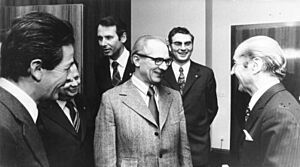
In 1974, Berlinguer met with Yugoslav president Josip Broz Tito in Belgrade. He wanted to build stronger ties with major communist parties in Europe, Asia, and Africa. In 1976, Berlinguer confirmed that the PCI was independent from the Soviet Communist Party. He spoke to 5,000 communist delegates in Moscow. He talked about a "pluralistic system," meaning the PCI wanted to build "a socialism that we believe necessary and possible only in Italy."
When Berlinguer finally got the PCI to condemn any "interference," the break with the Soviets was almost complete. Even though the party still received money from Moscow for some years. Since Italy was also affected by NATO's influence, the Soviets joked that the only interference Italian Communists couldn't stand was Soviet interference. In an interview, Berlinguer said he felt "safer under NATO's umbrella." However, Berlinguer's acceptance of NATO did not stop the U.S. from being suspicious of him. He appeared on the cover of Time magazine in June 1976, called "The Red Threat."
In 1977, Berlinguer met with Santiago Carrillo of the Spanish Communist Party and Georges Marchais of the French Communist Party in Madrid. They discussed the main ideas of Eurocommunism. A few months later, Berlinguer was in Moscow again. He gave another speech that his hosts did not like. It was only published in a censored version by Pravda.
Politics at Home
Step by step, Berlinguer was building support in the PCI for working with other parts of society. After his surprising ideas in 1970 and the Historic Compromise proposal, he published letters with Monsignor Luigi Bettazzi, a Catholic Bishop. This was amazing because Pope Pius XII had excommunicated communists after World War II. It seemed impossible for communists and Catholics to have any relationship.
This action also helped fight the common idea that the PCI was protecting leftist terrorists. This was during the worst years of terrorism in Italy. In this time, the PCI welcomed many Catholics, and discussions began about working together. Berlinguer's own Catholic family was kept private. In the general election of June 1976, the PCI won 34.4% of the votes.
Italy had a "government of national solidarity." Berlinguer said that in an emergency, a strong government was needed to solve the serious crisis. On March 16, 1978, Aldo Moro, the leader of the Christian Democratic Party, was kidnapped by the Red Brigades. This was a Marxist-Leninist terrorist group. This happened on the day the new government was supposed to be sworn in.
During this crisis, Berlinguer supported the "Front of Firmness." This meant refusing to negotiate with the terrorists. They had offered to free Moro if some imprisoned terrorists were released. Even though the PCI strongly opposed terrorism, the Moro incident made the party more isolated.
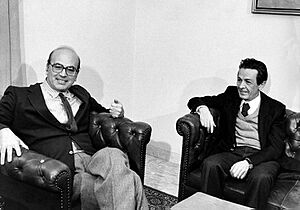
In June, the PCI supported a campaign against President Giovanni Leone. He was accused of being involved in a bribery scandal. This led to the President's resignation. Berlinguer also supported the election of the veteran Socialist Sandro Pertini as President of Italy. However, his presidency did not bring the results the PCI hoped for.
In Italy, when a new President is elected, the government usually resigns. The PCI expected Pertini to help them, but the President was influenced by other political leaders. These included Giovanni Spadolini and Bettino Craxi. So, the PCI remained out of the government.
During these years, the PCI governed many Italian regions, sometimes more than half of them. The regional governments of Emilia-Romagna and Tuscany showed that the PCI could govern well. Berlinguer focused on local power to show that the PCI could make things work efficiently. He personally took part in election campaigns in provinces and local councils. While other parties sent only local leaders, this helped the PCI win many elections at these levels.
Breaking with the Soviet Union
In 1980, the PCI publicly spoke out against the Soviet invasion of Afghanistan. Moscow then sent Georges Marchais to Rome to try to get Berlinguer to change his mind. But Berlinguer received him very coldly. The break with the Soviets and other communist parties became clear when the PCI did not attend the 1980 international conference of communist parties in Paris. Instead, Berlinguer made an official visit to China. In November, Berlinguer announced that the idea of a Historic Compromise was put aside. It would be replaced with the idea of the "democratic alternative."
In 1981, Berlinguer said that he believed "the progressive force of the October Revolution had been exhausted." The PCI criticized the strict rules in Poland. Soon, the PCI's split with the Soviet Communist Party became final and official. This was followed by a long argument between Pravda (the Soviet newspaper) and L'Unità (the PCI's official newspaper). A meeting with Fidel Castro in Havana did not make things better.
Death
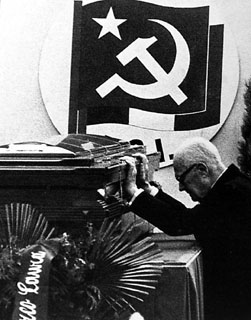
Berlinguer's last big message was a call for unity among leftist parties. On June 7, 1984, he had a brain hemorrhage while giving a speech in Padua. He fell into a coma that day and died four days later, on June 11. More than a million people attended his funeral in Piazza San Giovanni. This was the largest funeral in Italy's history at the time.
Leaders from all political parties honored his career. Even the Vatican expressed its sadness. The Soviet leader Gorbachev and Chinese prime minister Zhao Ziyang also attended his funeral.
Berlinguer's death happened six days before Italy's part of the 1984 European Parliament election. The PCI received many votes due to sympathy for him. For the only time, the PCI won the most votes in that election.
Impact on Italian Society
The Italian singer-songwriter Antonello Venditti wrote a song called "Dolce Enrico" ("Sweet Enrico") dedicated to Berlinguer after his death.
Italian actor and director Roberto Benigni publicly shared his admiration and personal affection for Berlinguer. Benigni not only made him the main character in the movie Berlinguer, I Love You but also appeared with Berlinguer at a public political event of the Italian Communist Party.
The Italian folk music band Modena City Ramblers wrote a song about Berlinguer's funeral, "I funerali di Berlinguer." It was released on their first full album, Riportando tutto a casa.
Electoral History
| Election | House | Constituency | Party | Votes | Result | |
|---|---|---|---|---|---|---|
| 1968 | Chamber of Deputies | Rome–Viterbo–Latina–Frosinone | PCI | 151,134 | ||
| 1972 | Chamber of Deputies | Rome–Viterbo–Latina–Frosinone | PCI | 230,722 | ||
| 1976 | Chamber of Deputies | Rome–Viterbo–Latina–Frosinone | PCI | 280,414 | ||
| 1979 | Chamber of Deputies | Rome–Viterbo–Latina–Frosinone | PCI | 238,399 | ||
| 1983 | Chamber of Deputies | Rome–Viterbo–Latina–Frosinone | PCI | 221,307 | ||
Writings
- Enrico Berlinguer, Antonio Bronda, Stephen Bodington, After Poland, Spokesman, 1982, ISBN: 0-85124-344-4.
See also
 In Spanish: Enrico Berlinguer para niños
In Spanish: Enrico Berlinguer para niños


